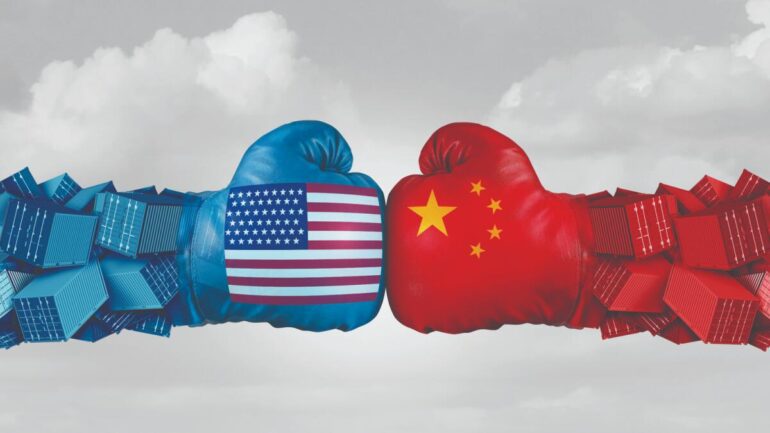TL;DR:
- US and China engage in a competitive race to develop advanced AI systems.
- Biden Administration restricts Chinese tech investments in semiconductors, quantum computing, and AI, leading to tensions.
- Other countries, including the UK and EU, contemplate their responses to the US actions.
- The US focuses on safeguarding AI and critical tech sectors, designating China, Hong Kong, and Macau as entities of concern.
- Semiconductors, microelectronics, and quantum technologies are identified as critical for national security.
- China condemns US decisions, calling it “de-globalization” and vows to protect its interests.
- China strengthens control over AI chip-making material exports in response to US measures.
- European Union and UK analyze the situation, considering potential national security risks associated with investments.
- The standoff triggers a global recalibration of AI-tech strategies, impacting international technological dynamics.
Main AI News:
The rapid evolution of cutting-edge artificial intelligence (AI) technology has ignited a fierce race between the United States and China, each vying to spearhead the development of supremely potent AI systems. This head-to-head pursuit has inadvertently set off a ripple effect, casting its shadow far beyond the borders of these two global giants.
In a bold stride, the Biden Administration has unveiled a strategic move that has triggered a tense standoff in the AI-tech domain. Their announcement of constraints on Chinese tech investments in crucial sectors such as semiconductors, quantum computing, and AI has set the stage for a new era of international technological power play. With this action, the United Kingdom and the European Union, key players on the global stage, find themselves at a crossroads, deliberating their responses to the US’s bold gambit.
One of the notable shifts that have transpired is the heightened vigilance the United States is exercising over AI and associated technologies. Recently, on August 9th, The White House issued two executive proclamations, the first of which proposes a novel incentive for hackers. They can now partake in a challenge to fortify the US’s cyber infrastructure using AI, earning monetary rewards in return. The second proclamation, however, designates China, Hong Kong, and Macau as entities of concern. It underscores the US’s intent to oversee investments in these locales and sectors, emphasizing their significance in terms of national security technologies and products.
Of particular note is the emphasis on semiconductors, the bedrock of AI development, microelectronics, and quantum information technologies. The document asserts their indispensability for military, intelligence, surveillance, and cyber capabilities. This stance is unequivocally articulated in the document: “The rapid advancement in semiconductors and microelectronics, quantum information technologies, and artificial intelligence capabilities by these countries significantly enhances their ability to conduct activities that threaten the national security of the United States.”
The initial scope of this proclamation covers only the aforementioned entities, yet a Biden administration official, in a conversation with Reuters, hinted at the possibility of expanding the list in the future. This aligns with the broader policy trajectory where the US has been progressively tightening the reins on Chinese technological ingress. An example is the embargo on exporting semiconductor chips to China since October 2022, a critical ingredient for high-powered AI systems, and the inclination for further restrictions.
China, in a swift rejoinder to the US announcement, conveyed its discontent through the official channel of the Chinese Embassy in the United States. The Ministry of Foreign Affairs spokesperson decried the “single-minded” decisions of the US with strong language, denouncing the politicization of business engagements and the stretching of security paradigms. It framed the move as an attempt to dislodge China from the global stage and labeled it as “de-globalization.” China avowed to vigilantly track these developments and uphold its rights.
Interestingly, in retort to previous US measures targeting AI technologies, China unveiled plans to tighten its grip on the export of AI chip-making materials. Furthermore, reports surfaced of major Chinese tech behemoths like Baidu, ByteDance, Tencent, and Alibaba placing billion-dollar orders for Nvidia A800 processors, anticipating even more stringent controls from the United States.
The reverberations of this standoff have transcended geographical boundaries, resonating notably across the European Union and the United Kingdom. Reacting to Biden’s move, a spokesperson from the office of UK Prime Minister Rishi Sunak stated that the UK would meticulously consider these measures while gauging potential national security risks linked to certain investments. The European Commission mirrored this sentiment by announcing their intent to dissect the US decision meticulously.
Conclusion:
The US-China AI tech standoff is causing reverberations worldwide. The rivalry over advanced AI technologies is reshaping international relationships and strategic priorities. Countries are navigating the new landscape by reevaluating their tech investments and policies to align with this era of heightened technological competition. The market can expect increased scrutiny, regulatory adjustments, and heightened emphasis on national security concerns as the AI-tech race unfolds.

